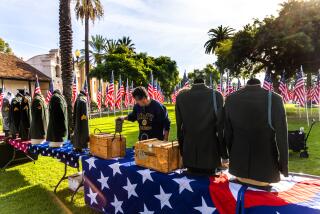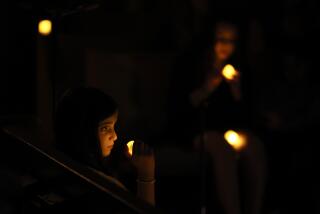For These Mothers, a War Means Body Bags, Not Glory
- Share via
This time, Mary Ann Haley has decided not to wait until the dying starts before she speaks out.
She was silent on the war in Vietnam until her son, sailor Michael Edward Haley, 22, was lost at sea in October, 1970, under circumstances that are still unclear.
She began asking questions. She joined the San Diego chapter of Gold Star Mothers of America, open to women who have lost a son or daughter in the line of duty during wartime.
She served several terms as president of the San Diego chapter before joining the headquarters in Washington last year as a national service officer. She is unmoved by congressional speeches favoring war.
“War isn’t glorious,” she said. “War means body bags, and mothers who spend the rest of their lives grieving for their dead sons.”
With 51,000 military personnel from San Diego County assigned to Operation Desert Shield, there is hardly a Pentagon scenario that doesn’t include fighting and dying by local troops.
Aerial bombardment? Three fighter squadrons from Miramar are aboard the carrier Ranger. Commandos dropped behind enemy lines? SEALs from Coronado.
A desert assault? Marines from Camp Pendleton are on the front lines. A seaborne landing in Kuwait? Again, Camp Pendleton.
If there is agony and death, it will be felt as sharply here as anywhere in the United States. And with it will come more political confrontation in the streets, angry and divisive.
Haley, 62, knows all this.
She has talked to Gold Star Mothers and other friends in San Diego who have relatives deployed in Saudi Arabia and the Persian Gulf. Her sister’s son, Mark Longpre, is with the Army in Saudi Arabia.
She doesn’t know how she expects President Bush to resolve the crisis. But she knows one thing for sure:
“I don’t want any more Gold Star Mothers.”
No Admittance
Both sides are claiming victory after a ruling by a Canadian immigration judge in the case of Arthur Rudolph, the German rocket scientist who worked in San Diego after World War II.
The judge ruled that Rudolph, now 84 and living in Hamburg, Germany, is an “inadmissible person” and cannot enter Canada. He had gone to Toronto to visit his daughter.
Judge William Willoughby, after weeks of testimony, based his 20-page ruling largely on Rudolph’s own testimony that he knew forced labor was used at the V-2 rocket factory where he was production manager.
Rudolph’s failure to oppose the Nazi SS in their use of forced labor constitutes culpability in a war crime by “omission” under Canadian law.
However, Willoughby said there is no compelling evidence, despite what the U.S. Department of Justice asserts, that Rudolph ordered or participated in the mistreatment of laborers or was even aware of their large-scale mistreatment.
He added that a document billed by the Department of Justice as a “confession” is no such thing.
Rudolph, who developed the Saturn rocket that put Americans on the moon, agreed in 1983 to relinquish his naturalized U.S. citizenship and leave the country. In exchange, the Department of Justice agreed not to try to strip him of his NASA pension.
The Canadian decision had been eagerly awaited by a handful of retired engineers in San Diego who worked with Rudolph at Solar Aircraft in the late 1940s and have kept in contact with him.
Bob Magness, 73, one of the engineers, said the decision vindicates the San Diegans’ belief that Rudolph was treated unfairly by the U.S. government.
Just Looking, Thanks
Facts and meaning.
* Those lights blazing in an otherwise darkened federal building during the Monday night peace march? Those people peering intently down at the marchers?
The lights and curious people were in the part of the building that houses the FBI.
* The committee to recall Councilwoman Linda Bernhardt will soon announce its plan to sue the City Council to make sure the election is held in the old 5th District, not the new one.
More to Read
Sign up for Essential California
The most important California stories and recommendations in your inbox every morning.
You may occasionally receive promotional content from the Los Angeles Times.













